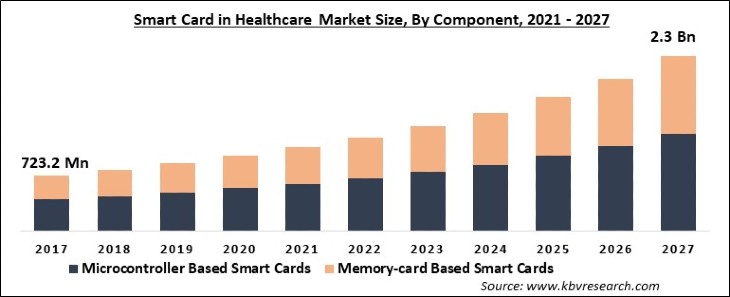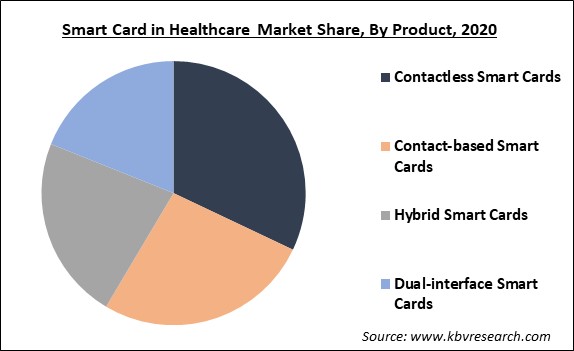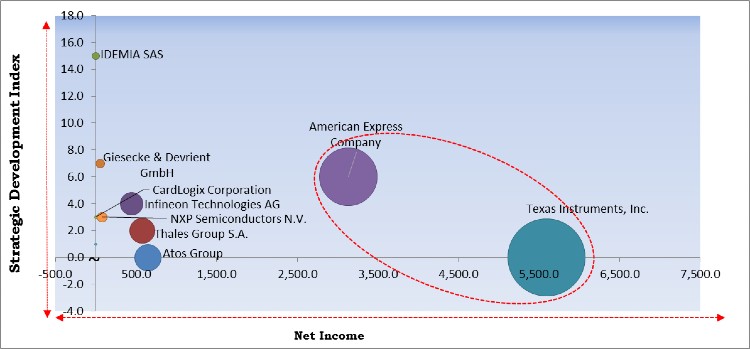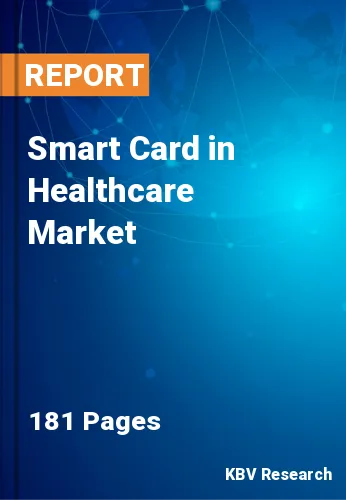The Global Smart Card in Healthcare Market size is expected to reach $2.3 billion by 2027, rising at a market growth of 13% CAGR during the forecast period. Smart cards in healthcare offer more privacy and security for managing personal data like personal health data and identity. In addition, this smart card validates a patient’s identity at the time of medical care and helps in health system management.
The increasing adoption of smart cards in managing patient data with patient management would boost the growth of smart cards in healthcare market. In addition, the surging usage of these smart cards decrease the chances of medical errors and reduce healthcare costs, which are estimated to surge the adoption of smart cards in the healthcare sector. Along with that, these smart cards have an embedded electronic chip with an integrated circuit, which decreases incidence regarding medical identities like fraud and theft. Due to these aspects, the smart card in healthcare market will witness a surge in demand. Growing demand for improved patient care with a low risk of fraud would further augment the growth of the market.
The increasing cases of misuse of medical benefits and other frauds in the healthcare sector have significantly augmented in the past few years. Several national governments are inclining towards smart cards for obtaining medical records of people in the country. In addition, smart health cards are generally issued by healthcare insurance organizations for improved regulation of claims & other medical practices.

The outbreak of the global COVID-19 pandemic has impacted various segments of the business domain. The imposition of various restrictions across various nations like the travel ban, lockdowns, temporary ban on manufacturing units has negatively impacted many industrial verticals. In addition, the supply chain disruption and low demand for a wide range of products and services are among the key impacts of the pandemic. Smart health card companies have also faced a decline in sales due to the pandemic.
The adoption of smart health cards has witnessed a decline due to the frequent lockdowns and supply chain disruptions. In addition, the instability caused by the pandemic in the insurance and healthcare sector is negatively impacting the smart card in healthcare market. The less demand for these smart cards during the pandemic would result in a slowdown of the overall market growth during the forecast period.
There are increasing government initiatives across various regions to push the implementation of smart cards in the healthcare sector to improve the functioning of the healthcare system. There are many organizations, which are also taking initiatives to promote the adoption of smart health cards among people. This would augment the demand for smart cards in healthcare sector.
As everything is getting online and digitalization is at its high pace, healthcare companies are also getting updated with the trend and are introducing numerous products like smart health cards. In addition, the adoption of smart cards is increasing in order to manage patient data with patient management tools, which is anticipated to surge the demand for smart cards in healthcare market.
There are more chances of security and data breaches of these smart health cards. Though, several key players are highly investing in making these cards smarter and safer than before to provide assurance to the customers about the safety of their data. But, until the security system of smart health cards gets more advanced, people may restrict themselves from getting the smart health card to avoid any security and data breaches.

Based on Product, the market is segmented into Contactless Smart Cards, Contact-based Smart Cards, Hybrid Smart Cards and Dual-interface Smart Cards. The hybrid smart cards segment is anticipated to witness the fastest growth rate over the forecast period. It is because these cards include more than one card technology. For example, these cards may consist of an embedded microprocessor smart card together with a contactless RFID proximity chip. In addition, dual interface smart cards utilize a single chip technology to connect through contact-based & contactless interfaces.
Based on Component, the market is segmented into Microcontroller Based Smart Cards and Memory-card Based Smart Cards. The microcontroller-based smart cards segment acquired the highest share in the market in 2020. These cards are compact and have massive memory, which would augment the growth of the segment over the forecast period. This segment is also projected to garner the fastest growth rate over the forecast period owing to the growing adoption in the healthcare sector.
| Report Attribute | Details |
|---|---|
| Market size value in 2020 | USD 984.2 Million |
| Market size forecast in 2027 | USD 2.3 Billion |
| Base Year | 2020 |
| Historical Period | 2017 to 2019 |
| Forecast Period | 2021 to 2027 |
| Revenue Growth Rate | CAGR of 13% from 2021 to 2027 |
| Number of Pages | 181 |
| Number of Tables | 263 |
| Report coverage | Market Trends, Revenue Estimation and Forecast, Segmentation Analysis, Regional and Country Breakdown, Competition Landscape, Companies Strategic Developments, Company Profiling |
| Segments covered | Product, Component, Region |
| Country scope | US, Canada, Mexico, Germany, UK, France, Russia, Spain, Italy, China, Japan, India, South Korea, Singapore, Malaysia, Brazil, Argentina, UAE, Saudi Arabia, South Africa, Nigeria |
| Growth Drivers |
|
| Restraints |
|
Based on Regions, the market is segmented into North America, Europe, Asia Pacific, and Latin America, Middle East & Africa. Asia Pacific region is estimated to procure the highest CAGR during the forecast period. It is due to aspects like the technologically improved healthcare system and supportive government initiatives, which are anticipated to surge the regional growth of the market during the forecast period.

Free Valuable Insights: Global Smart Card in Healthcare Market size to reach USD 2.3 Billion by 2027
The major strategies followed by the market participants are Partnerships. Based on the Analysis presented in the Cardinal matrix; American Express Company and Texas Instruments, Inc. are the forerunners in the Smart Card in Healthcare Market. Companies such as IDEMIA SAS, Giesecke & Devrient GmbH, Infineon Technologies AG are some of the key innovators in the market.
The market research report covers the analysis of key stake holders of the market. Key companies profiled in the report include Infineon Technologies AG, Texas Instruments, Inc., NXP Semiconductors N.V., Thales Group S.A., Atos Group, Giesecke & Devrient GmbH, American Express Company, VeriFone Holdings, Inc. (Francisco Partners), IDEMIA SAS (Advent International, Inc.) and CardLogix Corporation.
By Product
By Component
By Geography
The smart card in healthcare market size is projected to reach USD 2.3 billion by 2027.
Increasing government initiatives are driving the market in coming years, however, fair chances of data breaches limited the growth of the market.
Infineon Technologies AG, Texas Instruments, Inc., NXP Semiconductors N.V., Thales Group S.A., Atos Group, Giesecke & Devrient GmbH, American Express Company, VeriFone Holdings, Inc. (Francisco Partners), IDEMIA SAS (Advent International, Inc.) and CardLogix Corporation.
The expected CAGR of the smart card in healthcare market is 13% from 2021 to 2027.
Contactless smart cards dominated the market with the maximum share in 2020.
Our team of dedicated experts can provide you with attractive expansion opportunities for your business.

